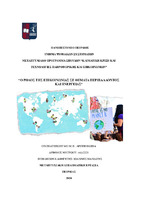Ο ρόλος της επικοινωνίας σε θέματα περιβάλλοντος και ενέργειας
The role of communication in environmental and energy matters

Προβολή/
Λέξεις κλειδιά
Επικοινωνία ; Περιβάλλον ; Ενέργεια ; Υπεύθυνη περιβαλλοντική συμπεριφορά ; Περιβαλλοντική εκπαίδευση ; Αειφόρος ανάπτυξη ; Πολιτική προστασία ; Μέσα Μαζικής Ενημέρωσης ; Περιβαλλοντικά θέματα και κρίσειςΠερίληψη
Η παρούσα μεταπτυχιακή διατριβή που εκπονήθηκε στα πλαίσια του Μεταπτυχιακού προγράμματος «Κλιματική Κρίση και Τεχνολογίες Πληροφορικής και Επικοινωνιών» του Πανεπιστημίου Πειραιώς, του τμήματος «Ψηφιακών Συστημάτων» χωρίζεται σε δύο μέρη: στο θεωρητικό και ερευνητικό. Το θεωρητικό μέρος αυτής έχει ως μεθοδολογία τη βιβλιογραφική ανασκόπηση ξενόγλωσσης και ελληνόγλωσσης βιβλιογραφίας. Το θέμα της διατριβής αποτελεί μείζονος σημασίας θέμα σε σχέση με περιβαλλοντικά θέματα και την επιρροή που ασκούν σχετικά με την πρόληψη και προστασία αυτών των θεμάτων τα μέσα μαζικής ενημέρωσης. Σκοπός της παρούσας διατριβής είναι η εξέταση του ρόλου που διαδραματίζει η επικοινωνία σε θέματα περιβάλλοντος και ενέργειας.
Στην πολύχρονη πορεία της Γης οι μεταβολές του κλίματος επήλθαν ως αποτέλεσμα ανθρωπογενών κυρίως παραγόντων. Κύριος αντίκτυπος της κλιματικής αλλαγής είναι η αύξηση της θερμοκρασίας, με δραματικές συνέπειες για όλα τα έμβια όντα της Γης αλλά και για το ίδιο το φυσικό περιβάλλον. Το «σπίτι» μας, όπως θα μπορούσε να χαρακτηριστεί το περιβάλλον, καταστρέφεται και καλούμαστε, ως «κάτοικοι» αυτού, να πάρουμε δραστικά μέτρα προστασίας και διαφύλαξής του. Για ένα ευοίωνο μέλλον, μεταξύ φύσης και ανθρώπου, καθίσταται επιτακτική η ανάγκη για την ανάληψη δράσεων αλλά και την επίδειξη μιας υπεύθυνης περιβαλλοντικής συμπεριφοράς από μέρους του ανθρώπου μέσω κατάλληλης περιβαλλοντικής εκπαίδευσης ώστε ο καθένας μας να συνειδητοποιήσει τη σημασία που το περιβάλλον ενέχει στη ζωή μας. Εξίσου, όμως, δράσεις και μέτρα πρέπει να λαμβάνονται σε εθνικό και διεθνές επίπεδο, με κατάλληλα μέτρα πολιτικής προστασίας και αειφόρου ανάπτυξης, μιας και τα περιβαλλοντικά προβλήματα και οι κρίσεις που δημιουργούν αυτά αφορούν σε παγκόσμιο επίπεδο.
Στη σύγχρονη εποχή της «κοινωνίας της γνώσης» στην αμφίδρομη ροή πληροφοριών και επικοινωνίας αναφορικά με τα θέματα περιβάλλοντος συνδράμουν και την ενισχύουν μέσα όπως το διαδίκτυο, τα μέσα κοινωνικής δικτύωσης κ.ά. καθώς και όλα τα παραδοσιακά μέσα μαζικής ενημέρωσης. Η ορθή εφαρμογή των πληροφοριών στη διαχείριση των φυσικών καταστροφών, με την οικοδόμηση ισχυρών σχέσεων μέσα στην κοινωνία, όχι μόνο αυξάνει την εμπιστοσύνη και την ενεργό συμμετοχή των πολιτών, αλλά αυξάνει επίσης την ευαισθητοποίηση, την εκπαίδευση και την συνειδητοποίηση των ατομικών και συλλογικών ευθυνών και ρόλων.
Η προσέγγιση του θέματος της εργασίας, αφετηρία έχει τη θεωρητική εξέταση εννοιών, όπως διαχείριση κρίσεων, φυσική καταστροφή, επικοινωνία, επικοινωνιακή στρατηγική, αειφόρος ανάπτυξη, μέσα μαζικής ενημέρωσης και καταλήγει στη μελέτη περιβαλλοντικών προβλημάτων και κρίσεων σε σχέση με το πώς αυτά επικοινωνούνται στο ευρύ κοινό, εξετάζοντας επί της ουσίας τον ρόλο της επικοινωνίας σε θέματα περιβάλλοντος, ενέργειας και κρίσεων.
Η βιβλιογραφική ανασκόπηση οδήγησε σε έρευνα διερεύνησης των στάσεων των πολιτών αναφορικά με την επικοινωνία σε θέματα περιβάλλοντος και ενέργειας. Οι ερευνητικοί στόχοι σχετίζονταν με τα μέσα ενημέρωσης για θέματα περιβάλλοντος, ενέργειας και κρίσεων, τις στάσεις των πολιτών για το πώς επικοινωνούνται τέτοια θέματα αλλά και το πώς η επικοινωνία μπορεί να συμβάλλει στην εκπαίδευση των πολιτών και την ευαισθητοποίηση τους σε θέματα βιώσιμης ανάπτυξης. Η έρευνα ήταν ποσοτική με δείγμα 300 ατόμων και συγχρονικό σχέδιο. Τα αποτελέσματα έδειξαν πως υπάρχει ενημέρωση για θέματα περιβάλλοντος και κρίσεων από το δείγμα χωρίς όμως η επικοινωνία να είναι απαραίτητα το ίδιο αξιόπιστη σε όλο το φάσμα της. Αξιοσημείωτο ήταν το ότι το σχολείο φαίνεται να είναι μια σημαντική πηγή περιβαλλοντικής εκπαίδευσης που συμβάλλει στην εγκαθίδρυση περιβαλλοντικής συνείδησης κι επομένως σε περιβαλλοντικές δράσεις.


